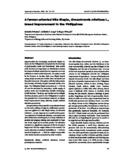A farmer-oriented Nile tilapia, Oreochromis niloticus L., breed improvement in the Philippines
Share
abstrak
Opportunities for developing small-scale tilapia industry in the Philippines is hampered by the shortage of good-quality seeds and broodstock. Most small-scale farmers are dependent on distribution centres for improved tilapia seeds that are expensive and not sufficient to meet market demands. An option would be for farmers to develop their own tilapia breeds using simple procedures within their technical and financial resources. This option will also help sustain the diversity of locally adapted domestic stocks of tilapia. The Philippine tilapia production of ~ 122 316 MT can be increased by ensuring a stable supply of quality seeds and transferring suitable technology to fish farmers. The study was carried out in a tilapia hatchery/nursery pond in the Philippines to explore the potential for a farmer-based research on tilapia breed improvement using relatively simple artificial selection procedures.
One generation of size-specific mass selection based on the early culling of large fry (collimation procedure) was applied on a Nile tilapia strain, Oreochromis niloticus L., in net cages set in a small earthen pond. Two episodes of directional selection were performed after initial removal of large fry at 21 days. Selection of parents and progeny testing were conducted in hapa and B-net cages set in earthen ponds. The selection resulted in a significant response of 8% for standard length and 29% for weight relative to the control. The crude estimates of realized heritability is ~ 16% for standard length and ~26% for weight comparable with similar studies conducted by other workers.
Suggested Citation
Basiao, Z. U., Arago, A. L., & Doyle, R. W. (2005). A farmer-oriented Nile tilapia, Oreochromis niloticus L., breed improvement in the Philippines. Aquaculture Research , 36(2), 113-119. https://doi.org/10.1111/j.1365-2109.2004.01053.x
Subjek
selective breeding  ; brackishwater fishes
; brackishwater fishes  ; seed production
; seed production  ; domestication
; domestication  ; body size
; body size  ; body weight
; body weight  ; fry
; fry  ; biometrics
; biometrics  ; length
; length  ; pond culture
; pond culture  ; aquaculture techniques
; aquaculture techniques  ; financing
; financing  ; culling
; culling  ; biological differences; genetic variation
; biological differences; genetic variation  ; fish culture
; fish culture  ; Oreochromis niloticus
; Oreochromis niloticus  ; Philippines
; Philippines  ; tilapia
; tilapia  ; artificial selection
; artificial selection  ; Farmer participatory research
; Farmer participatory research
 ; brackishwater fishes
; brackishwater fishes  ; seed production
; seed production  ; domestication
; domestication  ; body size
; body size  ; body weight
; body weight  ; fry
; fry  ; biometrics
; biometrics  ; length
; length  ; pond culture
; pond culture  ; aquaculture techniques
; aquaculture techniques  ; financing
; financing  ; culling
; culling  ; biological differences; genetic variation
; biological differences; genetic variation  ; fish culture
; fish culture  ; Oreochromis niloticus
; Oreochromis niloticus  ; Philippines
; Philippines  ; tilapia
; tilapia  ; artificial selection
; artificial selection  ; Farmer participatory research
; Farmer participatory research
Koleksi
- AQD Journal Articles [1249]

